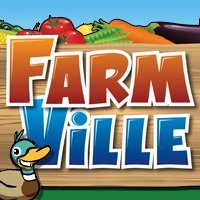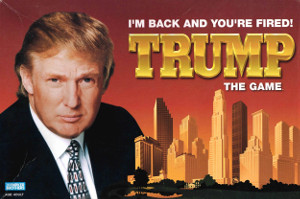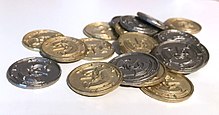
Gambling is the wagering of something of value on a random event with the intent of winning something else of value, where instances of strategy are discounted. Gambling thus requires three elements to be present: consideration, risk (chance), and a prize. The outcome of the wager is often immediate, such as a single roll of dice, a spin of a roulette wheel, or a horse crossing the finish line, but longer time frames are also common, allowing wagers on the outcome of a future sports contest or even an entire sports season.

Monopoly is a multiplayer economics-themed board game. In the game, players roll two dice to move around the game board, buying and trading properties and developing them with houses and hotels. Players collect rent from their opponents and aim to drive them into bankruptcy. Money can also be gained or lost through Chance and Community Chest cards and tax squares. Players receive a salary every time they pass "Go" and can end up in jail, from which they cannot move until they have met one of three conditions. House rules, hundreds of different editions, many spin-offs, and related media exist. Monopoly has become a part of international popular culture, having been licensed locally in more than 103 countries and printed in more than 37 languages. As of 2015, it was estimated that the game had sold 275 million copies worldwide. The original game was based on locations in Atlantic City, New Jersey, United States.
A massively multiplayer online role-playing game (MMORPG) is a video game that combines aspects of a role-playing video game and a massively multiplayer online game.
A virtual economy is an emergent economy existing in a virtual world, usually exchanging virtual goods in the context of an online game, particularly in massively multiplayer online games (MMOs). People enter these virtual economies for recreation and entertainment rather than necessity, which means that virtual economies lack the aspects of a real economy that are not considered to be "fun". However, some people do interact with virtual economies for "real" economic benefit.

Parker Brothers was an American toy and game manufacturer which in 1991 became a brand of Hasbro. More than 1,800 games were published under the Parker Brothers name since 1883. Among its products were Monopoly, Clue, Sorry!, Risk, Trivial Pursuit, Ouija, Aggravation, Bop It, Scrabble, and Probe. The trade name became defunct with former products being marketed under the "Hasbro Gaming" label with the logo shown on Monopoly games.

An electronic game is a game that uses electronics to create an interactive system with which a player can play. Video games are the most common form today, and for this reason the two terms are often used interchangeably. There are other common forms of electronic game including handheld electronic games, standalone systems, and exclusively non-visual products.
Virtual crime, can be described as a criminal act conducted in a virtual world -- usually massively multiplayer online role-playing games, MMORPGs. To grasp the definition of virtual crime, the modern interpretation of the term "virtual" must be assessed to portray the implications of virtual crime. In this sense, virtual crime describes those online acts that “evoke the effects of real crime” but are not widely considered to be prosecutable acts.
Gold farming is the practice of playing a massively multiplayer online game (MMO) to acquire in-game currency, later selling it for real-world money.

The board game Monopoly has its origin in the early 20th century. The earliest known version, known as The Landlord's Game, was designed by Elizabeth Magie and first patented in 1904, but existed as early as 1902. Magie, a follower of Henry George, originally intended The Landlord's Game to illustrate the economic consequences of Ricardo's Law of economic rent and the Georgist concepts of economic privilege and land value taxation. A series of board games was developed from 1906 through the 1930s that involved the buying and selling of land and the development of that land. By 1933, a board game had been created much like the modern version of Monopoly sold by Parker Brothers and its related companies through the rest of the 20th century, and into the 21st. Several people, mostly in the midwestern United States and near the East Coast of the United States, contributed to design and evolution.
Virtual currency, or virtual money, is a digital currency that is largely unregulated, issued and usually controlled by its developers, and used and accepted electronically among the members of a specific virtual community. In 2014, the European Banking Authority defined virtual currency as "a digital representation of value that is neither issued by a central bank or a public authority, nor necessarily attached to a fiat currency but is accepted by natural or legal persons as a means of payment and can be transferred, stored or traded electronically." A digital currency issued by a central bank is referred to as a central bank digital currency.

Easy Money or The Game of Easy Money was a board game introduced by Milton Bradley Company in 1935. Like Monopoly, the game is based on The Landlord's Game in the movement of pieces around the board, the use of cards, properties that can be purchased, and houses that can be established on them.
Microtransactions, sometimes abbreviated as mtx, are a business model where users can purchase virtual goods with micropayments within a game. Microtransactions are often used in free-to-play games to provide a revenue source for the developers. While microtransactions are a staple of the mobile app market, they are also seen on PC software such as Valve's Steam digital distribution platform, as well as console gaming.
A stock market simulator is computer software that reproduces behavior and features of a stock market, so that a user may practice trading stocks without financial risk. Paper trading, sometimes also called "virtual stock trading", is a simulated trading process in which would-be investors can practice investing without committing money.
Virtual goods are non-physical objects and money purchased for use in online communities or online games. Digital goods, on the other hand, may be a broader category including digital books, music, and movies. Virtual goods are intangible by definition.
A currency is a particular authorized monetary system, monetized in specific units which may be given international value by their exchange values in foreign exchange.

Baseball Boss was a web based, free online MMOG baseball game published by Challenge Games. Baseball Boss is also an official licensee of Major League Baseball Advanced Media. The game combined virtual baseball card collecting and fantasy baseball simulation through head to head completion against historical teams and other online players. The game was released on July 10, 2008. Players were given cards of real baseball players from all of baseball's ages to create teams of players using their cards. Players then attempted to move up "classes," from Rookie to Hall of Fame by defeating other players' teams through simulated challenges. Players spent tickets, earned for sending challenges to other teams, to purchase new packs of cards from the Market or new cards from other users in the Auction House. Baseball Boss features two brands of cards, the "National" base brand and the "Spire" premium brand. In addition to playing against other online users, Baseball Boss allowed users to collect entire sets or a group of their favorite cards in a way that resembled virtual baseball card collecting, using "Shoeboxes".

FarmVille is a series of agriculture-simulation social network games developed and published by Zynga in 2009. It is similar to Happy Farm and Farm Town. Its gameplay involves various aspects of farmland management, such as plowing land, planting, growing, and harvesting crops, harvesting trees and raising livestock. The sequels FarmVille 2 and FarmVille 3 were released in September 2012 and November 2021, respectively.
Massively multiplayer online real-time strategy game (MMORTS) mixes the genres of real-time strategy and massively multiplayer online games, possibly in the form of web browser-based games, in which a very large number of players interact with one another within a virtual world. Players often assume the role of a general, king, or other type of figurehead leading an army into battle while maintaining the resources needed for such warfare. The titles are often based in a sci-fi or fantasy universe and are distinguished from single or small-scale multiplayer RTSes by the number of players and common use of a persistent world, generally hosted by the game's publisher, which continues to evolve even when the player is offline.

Trump: The Game is a board game named after Donald Trump. Milton Bradley Company initially released the game in 1989, but it sold poorly, with only 800,000 copies sold out of an expected two million. Parker Brothers re-released Trump: The Game in 2004 following the success of Trump's reality television series, The Apprentice, from earlier that year. Trump: The Game received poor reviews from critics and the public audience.

A gacha game is a video game that implements the gacha mechanic. Similar to loot boxes, gacha games entice players to spend in-game currency to receive a random in-game item. Some in-game currency generally can be gained through game play, and some by purchasing it from the game publisher using real-world funds.











